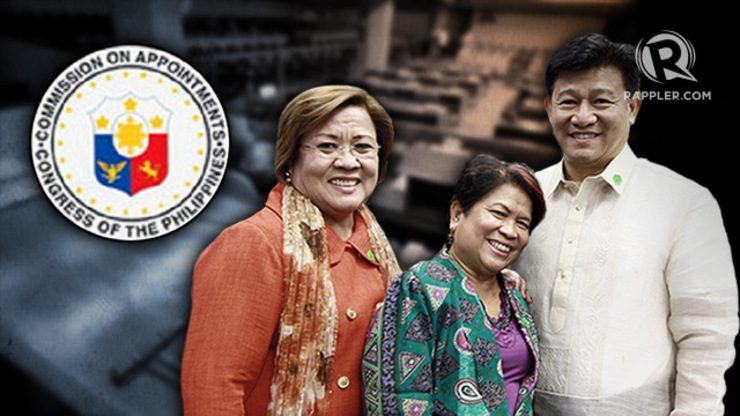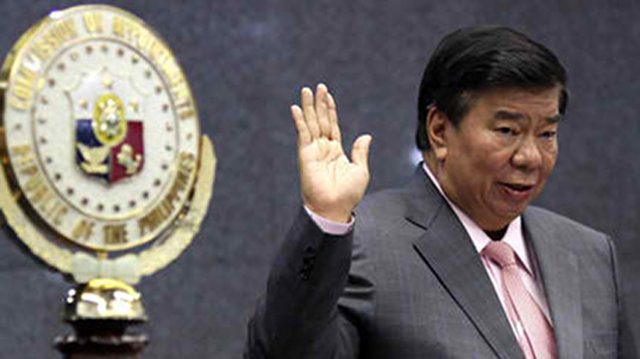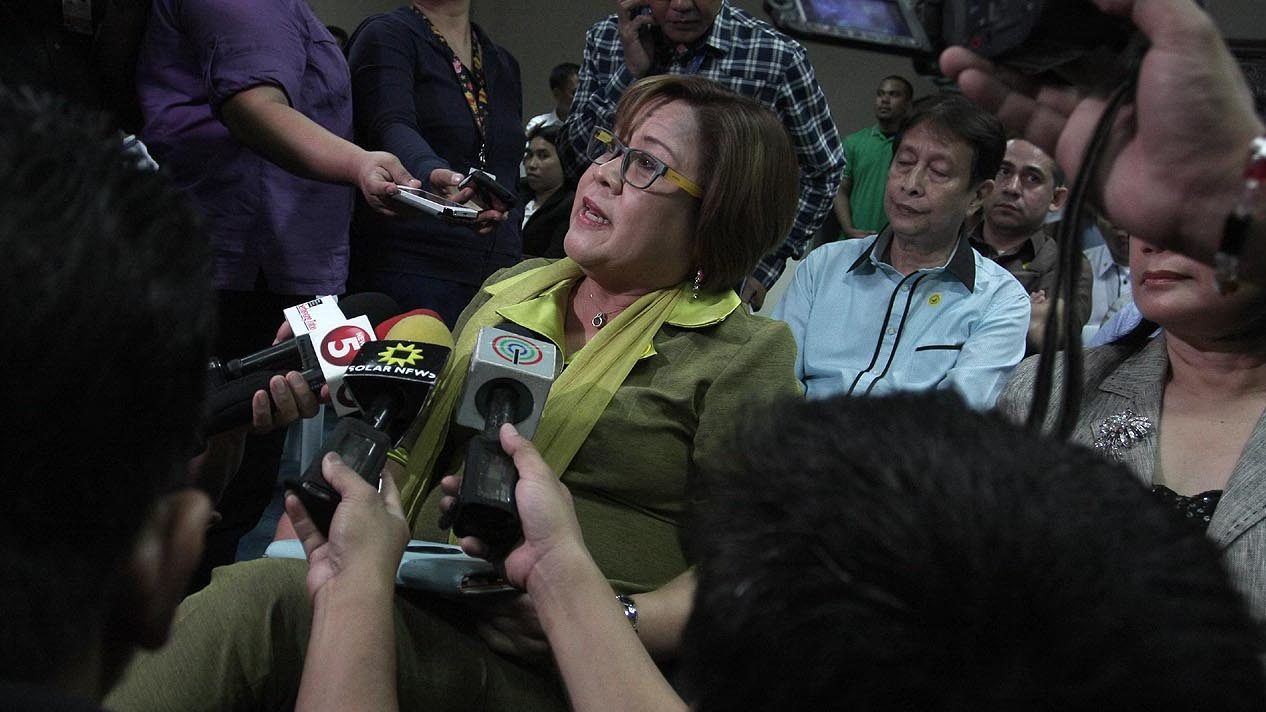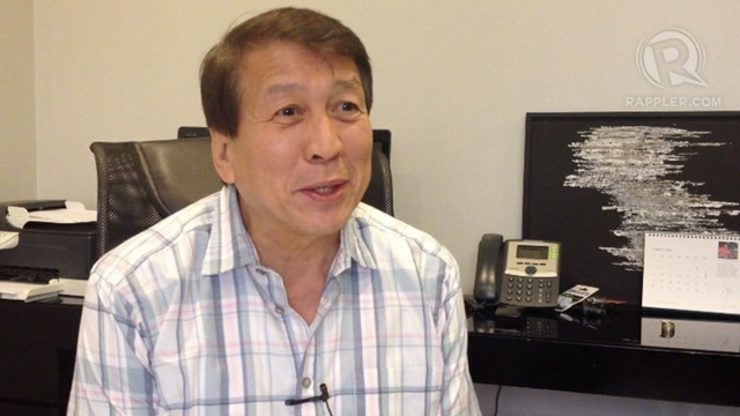SUMMARY
This is AI generated summarization, which may have errors. For context, always refer to the full article.

First of three parts
MANILA, Philippines – When Justice Secretary Leila de Lima, Social Welfare Secretary Dinky Soliman, and Environment Secretary Ramon Paje were finally confirmed, they were so euphoric that they obliged not just with standard photo-ops but even selfies with reporters. Palace spokespersons were equally ecstatic and tweeted their congratulations.
What was lost in the celebration was the answer to one crucial question: Why did it take all of 4 years to confirm the President’s alter egos?
Delays are nothing new in the body that screens the President’s men and women: the Commission on Appointments (CA). Yet the lawmakers’ approval that came near the end of the chief executive’s term raises questions about the work of the so-called “all-powerful” Commission, and the purpose of such a grueling process.
The 4-year wait is just a symptom of the problems that appointees, observers, and even the President and CA members notice in the Commission through the years.
In this 3-part series, Rappler takes a look at the confirmation process that has become arbitrary, highly personal, political, and vulnerable to horse-trading and corruption. Insiders say the system has become so flawed it cries out for reforms at the least, and at worst, abolition.
Creature of the Constitution
While often associated with Congress and mistaken as a congressional committee, the CA is a different beast. It is neither under the Senate nor the House of Representatives, but is a separate body whose authority comes from the 1987 Constitution.
“There shall be a Commission on Appointments consisting of the President of the Senate, as ex-officio Chairman, 12 Senators and 12 Members of the House of Representatives, elected by each House on the basis of proportional representation from the political parties or organizations registered under the party-list system.”
The Constitution spells out the officials subject to confirmation:
Loosely copied from the US Senate confirmation system, the CA ideally checks the abuse of the President’s appointing power, and evaluates the integrity, competence and fitness of nominees through the act of confirming or rejecting appointments.
To do this task, the CA has its own budget of P538 million for 2014, including P150,000 in monthly Maintenance and Other Operating Expenses (MOOE) for each member, its own set of officers and 23 committees, its own secretariat of 136 people complete with an investigative arm, its own office at the PNB Building in Pasay, and a staff of about 5 people per member – all separate from the Senate and the House.
For all its powers and organizational support, it sometimes takes the CA years not only to confirm officials but also to simply schedule them for hearings. These delays contribute to the controversial cycle of appointments, reappointments and the so-called “bypass” or inaction on a nomination at the close of session of Congress.

Foot-dragging & 101 Reasons for Delays
On paper, the CA sets a straightforward and fixed timeframe for scheduling hearings. The Commission’s internal rules provide that after the president submits a nomination, the nominee has 15 days to submit documentary requirements like statements of assets and liabilities, tax returns, and a medical certificate. Based on the rules, failure to comply after an extended 15-day period is grounds for rejection.
After the submission of documents, the Senate president refers the nomination to the committee, and has it published in newspapers within 3 days. A week later, the committee starts considering the nomination through public hearing.
Practice is something else, though. Senate President Franklin Drilon admitted to Rappler that the commission is lax in implementing its own rules.
“If [nominees] do not submit, then precisely, the Commission may either give them more time because that’s discretionary, or the nominee may ask for more time. There are 101 factors [for delays]. That’s exaggerating but there are many factors you have to look at,” said Drilon, CA chairman since 2013, and years 2000, 2001 to 2006.

One factor is the unavailability of the nominee and legislators. Gerardo Josue, director of the CA Information and Planning Service, said the secretariat has to work around the busy schedule of politicians.
“Our members wear two hats: as a legislator and as a member of the Commission and they also serve their constituencies. Sometimes, they have to weigh like if there is a hearing in the Senate or the House that is really important like a budget call, of course they will prioritize that,” Josue said.
Yet delays are also done deliberately. Senator Vicente “Tito” Sotto III, a periodic CA member since 1992, said the President or the nominee can stall the submission of papers, especially for a controversial appointment.
“There have been instances when the executive department does not submit the nomination. Or the nominee will just drag his feet and the nomination won’t be taken up in the CA. They don’t want to submit documents because their lives will be opened to scrutiny in the CA,” Sotto said in Filipino.
Drilon recalled that the late budget secretary Emilia Boncodin refused to complete her documents during the presidency of Gloria Macapagal Arroyo. Until now, the Senate President said, he even has to call up cabinet secretaries just to ask them to submit papers when the President inquires about the status of their confirmation.
|
Aquino officials CA repeatedly bypassed |
|||
|
Official |
Original Appointment |
Submission of Documents |
Times bypassed (as of |
|
DOJ Secretary Leila de Lima* |
June 30, 2010 |
September 16, 2010 |
17 |
|
DSWD Secretary Dinky Soliman* |
June 30, 2010 |
September 16, 2010 |
17 |
|
COA Commissioner Heidi Mendoza* |
March 30, 2011 |
July 20, 2011 |
14 |
|
DENR Secretary Ramon Paje* |
June 13, 2011 |
July 26, 2011 |
13 |
|
Comelec Commissioner Grace Padaca |
September 28, 2012 |
November 29, 2012 |
8 |
|
DOE Secretary Jericho Petilla |
October 30, 2012 |
November 29, 2012 |
7 |
Source: Commission on Appointments
*Confirmed June 2014
Notorious Section 20 and ‘traditions’
The CA is also to blame for the protracted process. While members are not strict about guidelines on scheduling hearings, they adhere to one rule: the notorious Section 20. Known as the one-person veto or the blackball, this rule allows a single member to suspend consideration of a nomination except on the last session day, without having to give any explanation.
An ex-CA member who refused to be named told Rappler that Section 20 is actually rarely invoked but members cower to a colleague’s mere threat of using it. Sotto said that members have a tendency “to support a colleague, keep quiet or practice acquiescence” but the former lawmaker finds this tolerance problematic.
“You’re performing a duty there. A member of the CA should not project himself as arbitrary, capricious and whimsical. You cannot say, ‘Ayoko eh.’ (I don’t like it). It’s supposed to be a body of reasonable, intelligent people, and basically immune from politics,” said the ex-congressman.
Also lengthening the delay is the tradition of giving the committee chairperson the “prerogative” to schedule the hearing.
For example, CA energy committee chairman Sergio Osmeña III openly refuses to schedule Energy Secretary Jericho Petilla for a hearing nearly two years since his appointment. Completing his documents in November 2012, Petilla is the only secretary still unconfirmed as he earned the senator’s ire for allegedly being an “awful manager” and for failing to address the power problem.
In De Lima’s case, CA records show that she completed her requirements as early as September 2010 but she faced the Commission only on June 4, nearly 4 years later. Commission insiders said De Lima initially did not follow the tradition of paying a courtesy call on members (hindi raw nagmamano).
“I didn’t know ako ang dapat magsabi sa kanilang, ‘Isalang na ninyo ako.’ I thought I’ll just wait for an appropriate notice,” was De Lima’s response after she was finally confirmed. (I didn’t know I was supposed to tell them to schedule me.)

Still, by the other members’ own admission and a check of the CA rules, it is the job of the CA, not the appointee, to schedule hearings.
Former CA secretary Catherine Bello said Commission members did not always evade confronting nominees. Head of the secretariat during the presidency of Fidel Ramos, she recalled that back then, hearings were regular, jampacked and explosive.
“Senator John Osmeña took the floor to explain his no vote. He said, ‘I don’t believe a salesman of IBM can be our secretary of foreign affairs,’ with Bobby Romulo right in front of him. Romulo was the president of IBM. Also for [ambassador to Spain] Isabel Wilson, he rejected her and called her names in plenary: matadera, mahadera. The woman was really crying. But that’s a brave man. You say what you feel.”
Bello added that in the nineties, year-long hearings were the longest. Asked if they had 3 to 4-year delays, she said, “Of course not. That is inconceivable.”
No political will to reject nominees
Now a fixture in the system, the multiple bypasses beg one obvious question: Why don’t the legislators just reject nominees instead of prolonging the agony?
Vincent Lazatin, executive director of the Transparency and Accountability Network, said he heard a common argument from CA members in the course of his group’s monitoring of appointments to constitutional commissions.
“I got this silly reason that it’s in deference to the President: ‘We don’t want to say no because it’s like rejecting the President.’ Well, get over it. That’s your job. Say yes or no. Don’t give us this bull,” Lazatin said.
CA Majority Leader and Ilocos Norte Representative Rodolfo Fariñas agreed that the Commission should stop the “pattern” of reappointments, which effectively makes permanent so-called ad interim or temporary appointments done when Congress is on break.
It’s not his original idea. As senator in 2007, President Benigno Aquino III criticized then president Arroyo for successively reappointing bypassed nominees, calling the practice “a clear mockery” of checks and balances. Aquino filed a bill limiting reappointments, only to perpetuate the same vicious cycle under his watch.
To Fariñas, there is no need for legislation if only Congress were not so “emasculated” and subservient to a powerful President whose 6-year term outlasts representatives’ 3 years in office.
“You will also ask if reappointments are now really done by design. To me, if Congress has the political will, Congress can quarrel with the executive there because the executive is already circumventing the confirmation process by not submitting appointments,” Fariñas told Rappler.
“’Pagka gusto ng CA, i-demand na nila na mag-report doon and then we should reject an appointee para naman matauhan sila na ‘Uy, buhay din pala ang animal na CA na iyan!”
(If the CA wants to, it can demand that appointees appear before it and reject an appointee so that they will realize that, “Oh, this animal of a CA is actually alive!”)

‘Rubberstamp, useless’
The irony is that despite the delays, Fariñas and Osmeña admit that the CA’s vetting of nominees is far from thorough.
“Even the design of our hearings is faulty in the sense that like on June 4, we [met] at 9:30 for the appointment of Secretary De Lima. We are allotted 30 minutes. Then at 10 am, we go to [Soliman]. We still have a commissioner from CSC, COA. You may want to be thorough but that’s hard to do,” Fariñas said.
While the CA’s Appointments Review and Investigation Service digs up negative findings on nominees’ backgrounds, some members gloss over these. In one hearing of diplomats, Senator Miriam Defensor Santiago even chided the secretariat for pointing out discrepancies in their assets and liabilities, calling these “trivial details” in comparison to the P10-billion pork barrel scam.
Defending his decision to sit on Petilla’s confirmation and grill Paje on hours on end, Osmeña said he asks substantial policy questions on issues like black sand mining and the national greening program but most of his fellow members do not do their homework and just “play Mr Nice Guy.”
“Nobody attends naman. Minsan mag-isa lang ako. It’s not a quorum. They’re not interested and yet they will vote. So it’s not an educated vote.” (Sometimes I am just alone.)
Fariñas said nominees no longer take the process seriously. He pointed out that even the head of the Presidential Security Group Raul Ubando could not get his retirement date right on CA documents, putting his birthday instead.
“I think the CA is being taken for granted that it’s like a rubberstamp body that just keeps on approving. In fact, some in the staff have been voicing out their sentiments that before, nominees used to be up on their toes, but now the attitude is cavalier, as if they are good as approved. We hope the process is given the proper solemnity.”
Beyond the process, delays and reappointments erode the value of confirmation. CA justice committee chairman Senator Aquilino “Koko” Pimentel III said this is particularly true for members of the President’s Cabinet.
“What’s the difference between a confirmed and an unconfirmed secretary? None. What can [De Lima] sign as confirmed which she cannot sign as unconfirmed? Nothing. Does she gain security of tenure because of confirmation? No. She’s still the president’s alter ego and the president can replace her anytime,” Pimentel said.
While the 3 secretaries and Malacañang hail their overdue confirmation, Osmeña said it does not really make any difference.
“It’s a bale wala (useless) process. Okay, he gets confirmed. So what? It doesn’t mean anything because they just keep getting reappointed. That’s a big loophole.” – Rappler.com
To be continued.
Part 2: Beef and pork: Confirmation politics and Napoles
Add a comment
How does this make you feel?
There are no comments yet. Add your comment to start the conversation.